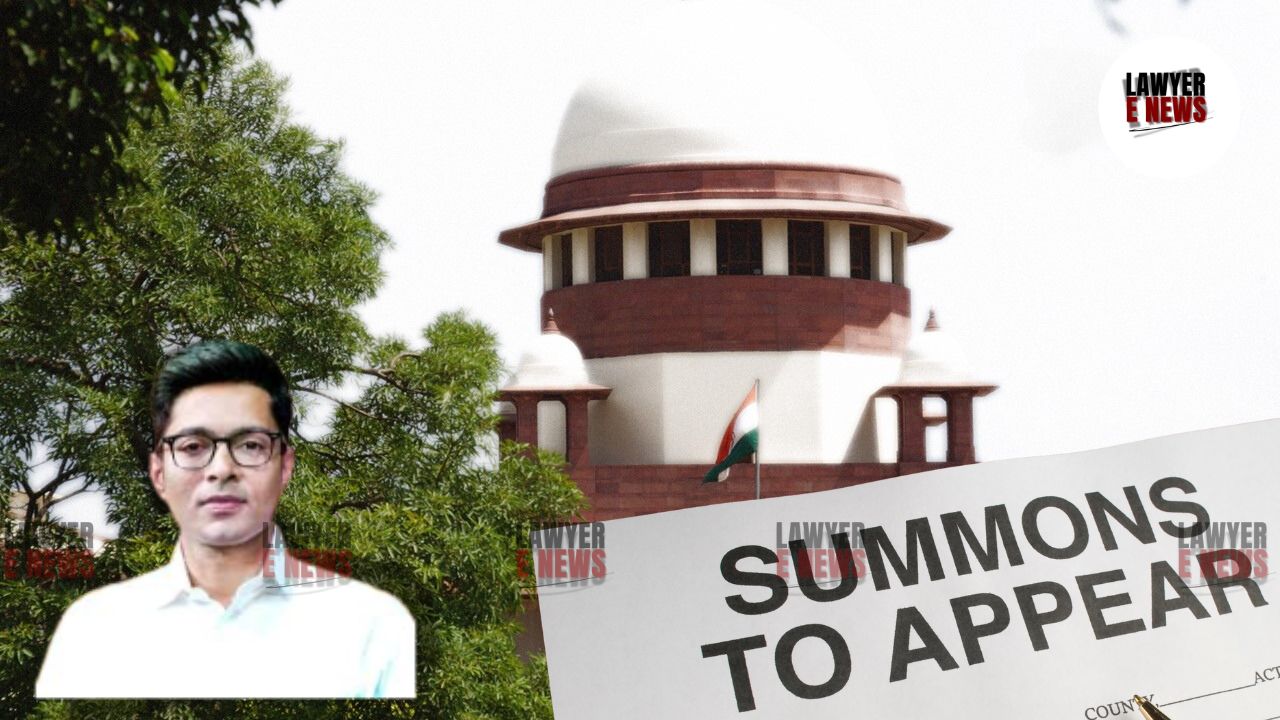-
by Admin
15 February 2026 5:35 AM



Today On September 9, 2024, the Supreme Court of India dismissed the appeals filed by Abhishek Banerjee and Rujira Banerjee, who sought to quash the summons issued by the Directorate of Enforcement (ED) under Section 50 of the Prevention of Money Laundering Act, 2002 (PMLA). The judgment, delivered by Justices Bela M. Trivedi and Satish Chandra Sharma, upheld the Delhi High Court's decision dismissing the challenge to the summons, emphasizing that PMLA provisions would override any inconsistencies in the Code of Criminal Procedure (CrPC).
Abhishek Banerjee, a prominent political figure, and his wife, Rujira Banerjee, were issued multiple summonses by the ED to appear in New Delhi as part of an investigation into a money laundering case. The case stemmed from an FIR filed by the Central Bureau of Investigation (CBI) regarding illegal coal mining and theft in the leasehold areas of Eastern Coalfields Limited (ECL), allegedly involving significant financial transactions amounting to ₹1,300 crore. Summons were issued under Section 50 of the PMLA, compelling the appellants to provide testimony and documents related to the investigation.
The appellants sought to quash the summonses, arguing that they should be allowed to appear in Kolkata instead of New Delhi, considering the location of the alleged offense and their residence.
PMLA's Supremacy Over CrPC: The Supreme Court reaffirmed that the PMLA is a self-contained code with overriding provisions under Section 71 of the Act, ensuring its provisions prevail over any inconsistent law, including the CrPC. The court stressed that the investigation of money laundering, a distinct offense, is governed by its own procedure under the PMLA, rather than the procedural safeguards outlined in the CrPC, such as those in Sections 160 and 161.
Summoning Under Section 50: The appellants challenged the ED’s authority to summon them under Section 50 of PMLA, arguing that they should be summoned in Kolkata rather than New Delhi. However, the court ruled that Section 50 of the PMLA confers wide powers upon the ED, enabling the agency to summon individuals for inquiry in any location it deems fit for the investigation. The court noted that ED had sufficient territorial nexus to summon the appellants in New Delhi, as part of the proceeds of crime was allegedly transferred to Delhi.
Gender-Neutral Application of Section 50: Addressing arguments raised on behalf of Rujira Banerjee regarding special protection for women under Section 160 of the CrPC, the court held that the PMLA does not differentiate between men and women in its summons provisions. Section 50, the court emphasized, is gender-neutral and lacks any proviso to exempt women from appearing at locations other than their domicile.
Previous Supreme Court Precedents: The judgment relied heavily on the Supreme Court’s 2022 ruling in Vijay Madanlal Choudhary v. Union of India, which upheld the constitutionality of various PMLA provisions, including Section 50, affirming that statements recorded under Section 50 are admissible in evidence and are not violative of Article 20(3) or 21 of the Constitution.
The court's primary legal reasoning focused on the unique nature of the PMLA, which deals with financial crimes that often transcend territorial jurisdictions. Section 50 grants authorities the power to summon individuals for inquiry into the proceeds of crime. The court emphasized that this inquiry is not akin to a police investigation under the CrPC but is a separate proceeding governed by the special provisions of the PMLA. Thus, general protections available under the CrPC, such as the territorial jurisdiction rules under Section 160, do not apply.
Justice Bela M. Trivedi, writing for the bench, observed: “The provisions of PMLA will have the effect notwithstanding anything inconsistent therewith contained in any other law for the time being in force, including the provisions of the CrPC”.
On the issue of territorial jurisdiction, the court stated, “There was adequate nexus of the offense and the offenders with the territory of Delhi. Hence, the ED’s summons to the appellants to appear in New Delhi is legally valid and justified”.
The Supreme Court’s dismissal of the appeal reinforces the ED’s broad powers under the PMLA to investigate money laundering offenses, including summoning individuals for inquiry in locations beyond their domicile. This judgment, in line with the court's earlier rulings, underscores the primacy of the PMLA in tackling financial crimes and clarifies that its provisions will override general procedural safeguards under the CrPC. The decision sets a precedent that could significantly impact future investigations under the PMLA, especially those involving high-profile individuals.
Date of Decision: September 9, 2024
Abhishek Banerjee & Anr. v. Directorate of Enforcement
